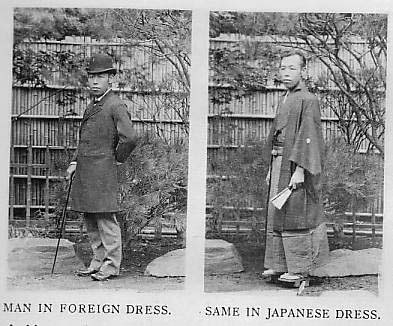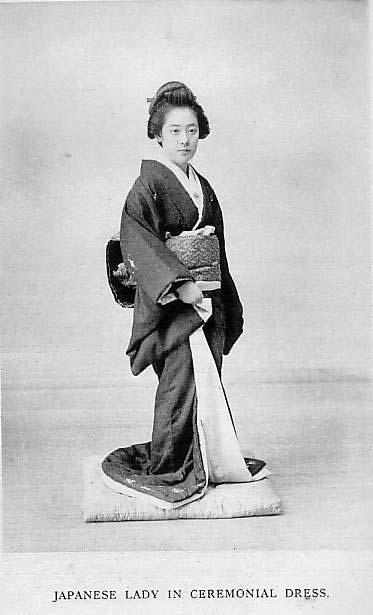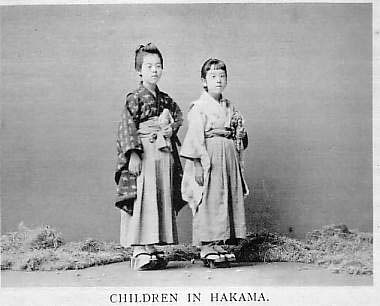Social Problems in Japan
Tokio, April 14th 1887
In a recent letter I referred to the movement lately set on foot in this country for reforming the dress of its women after Western styles.
The subject has excited some attention in Europe, and not a little criticism.
That harsh things should be said about it, especially by those who have been here, is not surprising.
The general attractiveness of the Japanese fair sex, as to which there are hardly two opinions, is due in a more than ordinary degree to the becoming character of their raiment and the grace with which it is worn.
Few Japanese women possess physical beauty of those lofty types which are the Western ideals.
They are for the most part comely and engaging rather than handsome.
Dark eyes and hair, pencilled eyebrows, well set necks, and remarkably good teeth, together with bright, artless manners and a winning smile, serve to draw attention from irregularities of feature which will hardly bear critical scrutiny.
It is the combination of physique, grace, dress, and manner that makes up the agreeable sum total of the average young girl or matron.
As well in the brisk, bronze-cheeked serving-maid, with her homely but tasteful garments, her eyes of kindness, and her pretty ways, as in the refined little lady of high degree, pale-skinned and gentle-mannered, in her rich, exquisitely neat dress of ceremony, the visitor and the resident alike recognize most pleasing specimens of womankind.
But they also recognize how much of the general outward effect is really due to the picturesqueness of the national garb.
If confirmation of this be needed, it is sufficient to behold the same women clad in foreign clothes; or to mix in any gathering where the two styles can be seen together.
Making full allowance for the disadvantages that, in the nature of things, must tell against a costume to which its wearer is wholly unaccustomed, no one who has eyes to see can then hesitate as to the artistic superiority of the Japaeses apparel.
And, besides its aethetic merits, the latter has other points of excellence.
It is healthy, in that it involves no distortion or compression, of the kinds imposed by Western fashions.
If the skirts of a well dressed lady's robes are gathered somewhat too tightly for very active locomotion - perhaps the only fault that can be found in her whole attire - no other part of her frame is subjected to unnatural constraint; while the massive girdle gives warmth and protection to the chief bodily organs.
Secondly, it is very much less expensive than the costly and irrational habiliments of the West.
Jewelry, moreover, forms no part of it in any station of life.
Again, its fashions are abiding.
While a Japanese belle, like all of her sex, delights in having good clothes and plenty of them, she has - or at least has hitherto had - the comfortable assurance that her ever-increasing wardrobe is in no danger of being at any moment thrown out of date by the caprices of Court milliners and fashion-mongers.
Lastly, it is admirably suited to the beautiful fabrics of the country.
It is no wonder, then, that the grievous change now in progress is loudly deprecated by nearly all onlookers.
With most of us the first feeling is one of wrathful indignation.
That the Japanese, who are before all things artistic, should set themselves in this cold-blooded way to blot out one of the most delightful and picturesque features of the whole national life is regarded as incredible, unnatural, and exasperating.
"It is Vandalism; it is sacrilege; it is senseless mimicry: it is everything that is bad."
That is the general lament, and there seems to be a good deal in its favour.
But, on the other hand, is it possible that a sacrifice so deplorable and so palpably to Japan's loss rests on no stronger or higher ground than a giddy aspiration to ape, even to this bitter end, the pomps and fashions of the West?
It is a habit in certain quarters to speak of the Japanese as a nation of children, always thirsting after some new toy.
Yet that character will hardly be assigned to Count Ito, even by the most reckless of censors.
And Count Ito it undoubtedly was who advised the Empress to inaugurate the new movement.
There must surely be something behind it all, of graver purpose and import than any yet divined, to have led a statesman with his cool head and sagacious brain to beget a reform of this sweeping nature, into that something - into the real springs of the movement-it seems worth while to enquire.



To undesstand this question at all, it is necessary to glance at the present state of Japan's progress.
Thoughtful watchers of events in this country are agreed that the Japanese people have now reached a very critical point in their career of advancement.
If they aim at complete success in their new civilization, it is impossible for them to remain any longer content with material, administrative, and educational reforms, of the kind pursued during the last 20 years with such unexampled vigour and resolution.
Not only into the body politic, but into the whole social and moral fabric, must be ingrafted those conditions and principles to which Western civilization owes its growth and vitality.
With the tone of that civilization perhaps nothing in Japan is so gravely out of harmony as the position of her women.
There is abundant proof that, if women are to take that part in the great work of national regeneration to which they are entitled, and which is essential for success, their whole position in society must be radically changed.
Now, they are at the disposal and mercy of others, and enjoy few personal rights.
Before marriage a Japanese daughter is a child, owing the profoundest submission to her parents and relatives.
She has no voice in the choosing of her husband, whom she barely sees, and of whom she practically knows nothing, before the nuptial ceremony.
The sexes make pairs, not matches, and the paring is managed by a go-between.
After marriage the wife is little better than a slave or chattel.
She may be divorced almost at will.
Docility, sacrifice, and self-effacement are well-nigh the sum of her daily duties.
It is to be remarked also that, while the inferior position of women has long been recognized as one of the darkest blots on Japan's ancient civilization, thus far the new civilization, instead of mending matters, has rather accentuated them.
The more Japanese men learn by foreign travel and study, the wider thereby must grow the gulf that divides them from the weaker sex, as long as the present social and domestic systems remain unaltered.
Plainly the sole way of curing these evils is to better the training and status of the women.
Not only must they receive good education and be granted fuller liberty, independence, and rights of property, but they must be awarded a higher place in society as well as in the household, and be protected by adequate marriage laws, social intercourse being at the same time so modified that men and women may mix freely before marriage.
Another matter which calls for attention in this context is the present system of domestic life.
In that is fully recognized by those who know Japan a wide sphere of useful and necessary reforms.
With the broad features of ordinary Japanese household life every one is by this time more or less well acquainted.
But probably few are aware that along with its good and attractive features, its exquisite cleanness and delightful simplicity, there are sundry conditions which have certainly wrought baneful effects on the national physique, and in some respects also the national morality; and which, besides, are in many ways unsuited to the conditions of Western civilization.
Removal of those drawbacks, by the gradual adoption of European modes of home life, houses and furniture in European style, and a proportion of European diet, is held to be of cardinal importance by Japan's ablest thinkers.
The task is far from being an easy one.
Neither men nor women are very ready - few are pecuniarily able - to move in reforms of such dimensions.
They are wedded, naturally enough, to ancient traditions and habits.
It is believed, however, that the adoption of foreign apparel by women of the upper and upper-middle classes would be a serviceable aid to getting over the threshold of the difficulty.
Japanese female costume is essentially suited to Japanese modes of life, and needs but little adaptation to fit it for life in the Western style.
European female costume, on the other hand, is incompatible with existence a la Japonaise.
If, then, says the Japanese reformer, our women can be induced to wear foreign attire, their husbands will be obliged to modify the dwellings they inhabit, and to adopt in a greater or less degree improved systems of domestic and even social life.
Women will also be woking out, in part, a change for the better in their own condition and status, and gradually raising themselves to a place in the household, in their husband's eyes, and in society, which shall fit them for co-operation in the work of Japan's advancement.
Much that has been said here regarding the national dress of Japanese women applies equally to that of the men.
The latter, as worn by the upper and middle classes, is a great deal more becoming, comfortable, and inexpensive than the clumsy male garments of Europe, and is easily adaptable to life in foreign houses.
But, while well enough for men of sedentary habits, it is hardly fitted for those active pursuits which are the accompaniments of Western ways of life.
And there is a further argument for its abolition, which cuts pretty deeply into the free criticisms that have been bestowed on the Japanese desire for a change.
If there is one doctrine which we Westerns have hammered into the minds of Orientals more forcibly than any other, it is the doctrine of their own inferiority.
The idea of most Europeans, "from noblemen to tailors," is that an Oriental, though possibly one of God's creatures, hails from some substratum far down on the human scale, and is to be treated accordingly.
That is the kind of teaching which has inclined this most patriotic of peoples towards the adoption of expedients which, without sacrificing their national individuality, may tend to make Occidentals forget the differences between them.
Dress, withiut doubt, is an important factor in this question.
As long as a Japanese wears his country's costume, it marks him conspicuously an Oriental, and tells against him in his intercourse with foreigners.
Substitute European clothing, and the contrast becomes less striking.
He at once receives greater recognition and respect.
Similar considerations help to account for the willingness that is already being shown by a few ladies of the upper classes to abandon their own charming and graceful apparel for habiliments which must be utterly repugnant to their artistic taste.
Seeing that Japan's unique aspiration is admittance into the circle of Christendom, we can hardly be astonished if her daughters aim at dressing themselves like the rest of the ladies of Christendom, even though the change be, as it certainly is, for its own sake unwelcome and against the grain.
If the foregoing be a correct outline of the reasons by which Count Ito was swayed when recommending the Empress and her Court to set the example of adopting European dress, we are led to conclude that the new movement, so far from being a blind following after Western ways merely because they are Western, is part of a high and deliberate scheme for bringing Japan into line with the nations of the Occident, and for reducing to the narrowest breadth possible the gulf of separation that lies between them.
Bent on this task, the Japanese Chancellor believes that it can only be achieved by a modification of the domestic and social habits of Old Japan.
He sees that improved methods of home life are necessary to the physical and moral amelioration of his people, that the whole training and status of women call for thorough reform, and that social intercourse needs to be placed on a broader and freer basis.
He believes that these changes may best be wrought on the models of systems which have grown up in the most advanced countries of the globe.
Further, he believes that a gradual assimilation of the national garb to that of Western lands will serve the double purpose of contributing to the above objects and of helping to blot out the stigma of Orientalism which, in spite of a long series of drastic reforms stamped with the seal of the world's approval, still clings to his progressive race.
Believing these things, he has not flinched from applying his remedies.
Here, then, we have the key to all the recent novelties - to this heart-breaking dress reform; to the improved means of education for girls and women; the thirst for foreign tongues, especially the English; the rapid growth of houses built, furnished, and managed in foreign style; the classes for training ladies in domestic work; and the multiplication of dances and other entertainments for the free intercourse of foreigners and Japanese, and of the Japanese among themselves.
All of these are due more or less to Government example or initiative.
There will long be rival opinions as to the wisdom of some of the above measusres and experiments; as to their necessity; as to whether they are sufficiently deliberate; as their power to penetrate far into the ranks of society, or to effect the ends in view.
On the question of ladies' dress, I, for one, am disposed to agree with the able editor of the Japan Mail that the ruthless sacrifice just begun might have been avoided by a modification of the national costume, which, while preserving its essential features, would have met all needful requirements at the present stage, and possibly even have furnished a happy solution of the vexed problem which Lady Harberton and her colleagues have made their own.
I also doubt whether the purses of more than a privileged few will prove equal to the cost of foreign clothing and its accessories.
But, whatever we may think about the policy and methods of the Japanese, it is impossible to withhold admiration of their profound earnestness.
And, after all, the rulers of Japan must be credited with understanding the needs of the people, and the way to meet those needs, a good deal better than any of us.
Count Ito in particular is known to be gifted with governing faculties of a high order, and with remarkale judgement in timing and attuning domestic measures to the beat of the national pulse.
The Times - May 21th.
Going Back to Article List
